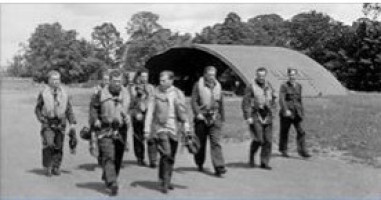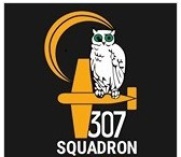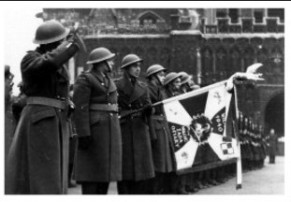
WW2 POLISH AIR FIGHTERS IN THE SECOND WORLD WAR
JURY'S INN
On Thursday, 8 December, Michael Parrott painted an incredible picture of the heroic Polish airmen who arrived in the UK in 1940 having escaped from their own country to France and then again, as the enemy progressed, to our shores. Some landed up in Exeter. These were indeed brave men and many died defending us.
The RAF authorities insisted these battle-hardened Polish airmen needed training - which consisted of practising formation-flying on bicycles! One airman, however, was allowed to demonstrate his flying skills on behalf of his colleagues. For 15 minutes hee executed non-stop loops and turns and then landed pperfectly, but stark naked! – he had removed all his clothes while negotiating those incredible acrobatics! In the face of this evidence of flying skills, the Poles were then allowed to fly. Many Polish squadrons were formed and one of them was 307 Squadron, the only Polish night-fighter squadron. They were given aircraft called “Defiants” which were so unreliable that the Brits refused to fly them - and their single guns could only be fired backwards! Polish pilots were used to being both pilot and gunner and many refused to fly these aircraft saying they were airmen not bus drivers.
307 Squadron moved to Exeter in April 1941. Its role was defensive, extending from Lands End to Bournemouth and South Wales. But when bombs were dropped on Exeter’s airfield one night killing three people, one crew decided, against orders and using the fires on the ground to light their way, to take off to fight and succeeded in shooting down enemy aircraft.
There were other squadrons at Exeter but none of them flew at night. Regrettably, the British airmen took to hooting owl noises at 307 because they were night flyers. So the Poles responded by designing a logo for themselves which incorporated the owl. To be presented with this badge one had to give three owl-like hoots. Even the overall Polish commander General Sikorski was required to do this before he became an honorary member.
Eventually the Squadron was given Beaufighter twin-engined aircraft which housed the pilot and a navigator, both facing forward. But there were still problems with the engines and they were very difficult to land when one engine had failed. During two years at Exeter, 21 crew were killed and 2 lost at sea because of engine failure or, occasionally, bad weather, but none of them through being shot down by the enemy!
Halfway through a daylight test flight near Winkleigh an engine caught fire so the plane crash-landed in a field. The landing knocked the two pilots and a civilian unconscious but one crew member recovered and, realising the aircraft would blow up at any minute, managed to haul his two companions free. Tragically, in doing so, he was himself trapped and killed when the plane blew up. His remains now lie in Higher Cemetery.
The high death rate from engine failure inevitably led to low morale amongst the men so their leader and much-loved tutor decided to take part in a patrol. At Lands End one engine failed and, instead of landing in a field or bailing out, he headed back to Exeter to set an example. He arrived in Exeter after a beautiful bit of flying but, as it landed on the one engine, a gust of wind flipped the plane over and it exploded. Another good man was lost.
A new squadron leader, concerned about the low morale and to try and cheer his men up, organised a song competition. The combined efforts of a poet and an accordion player produced the winning entry, titled “The Eagle Owls”. This was first performed at the old Civic Hall in Queen Street (now gone and replaced by WH Smith) and proved to be the highlight of the evening. All the monies raised went to the Mayor’s relief fund.
Exeter was heavily bombed on 2 April 1942. On 3 April the authorities decided there was no further danger, so many crew were stood down and went home to rest. That night 40 enemy bombers flew over and past Exeter planning to drop their bombs on the return trip (to enable them to flee more easily) and only four serviceable aircraft were available. Eight crewmen in these four planes shot down four enemy aircraft. No Poles were killed and this extraordinary achievement meant that the city was saved from total devastation because so many planeloads of bombs were not dropped
.
After this, close links with the city were formed and Polish airmen were invited to civic and many other functions. An interesting coincidence was that Polish squadrons are named after Polish cities and the home city motto for the members of 307 Squadron was “Simper Fidelis” – the same as Exeter’s!
On 15 November 1942 those very strong links were confirmed when 400 Polish airmen lined up outside the Cathedral for a ceremony in which the Polish flag was presented to the City of Exeter as a mark of friendship. The mayor, representing the city, gave a speech at the Guildhall concluding with “… they were our guardian angels.” The flag was to be displayed every year for future generations to remember what these brave men had done for Exeter
.
In April 1943 the Squadron was suddenly moved to Swansea, leaving friends, girlfriends, wives and children behind. They were eventually transferred to Pordunnock in Cornwall where they flew Mosquitos. These were fast and agile but built of wood and again there were problems with engine failure.
.
With fewer enemy attacks the Squadron’s role became offensive rather than defensive, patrolling the Bay of Biscay, France, Holland, even Germany. In September 1944, six flight crews were given secret instructions to fly around Holland for thirty minutes but not to shoot the enemy. Sadly, the last Mosquito of the group was shot down and the bodies were never recovered. This odd mission was performed on the day the British landed at Arnhem and the Polish excursion’s purpose was to distract the enemy.
The Squadron flew Mosquitoes until the war ended and was then disbanded in 1948. The puppet Polish government invited its citizens to return and some did, anxious to make contact with their loved ones. They were then all rounded up and executed – for treason!!! After that news percolated through, no one else was prepared to return home! The British Government agreed that they could stay in the UK but also offered them transport to the Commonwealth (Australia, New Zealand. Canada etc.) or to the warm conditions in Argentina. Many left and some stayed.
Throughout the war, 2,000 Polish airmen were killed, having had no interim contact with their families back home. In all approximately six million Polish citizens perished during World War II, about one fifth of the pre-war population. Remember the Poppies placed in the Tower of London Moat?! Poppies representing the Polish dead would have filled that moat seven times over!!
When Michael learned about the Polish flag being presented to the city he enquired about it at the Guildhall but, despite an exhaustive search, no one could locate it. The Mayor’s and the Council offices were searched in vain. Although many remembered the flag from the 1970s it had completely disappeared. It was very embarrassing. As a result, on 15 November 2012, exactly 70 years after the presentation in front of the Cathedral in 1942, a ceremony took place in which a new Polish flag was presented to the Lord Mayor and raised over the Guildhall. It has been raised on that day ever since.
Since then, Michael has been the chief mover in a small charity called the 307 Squadron Project (http://www.307squadron.org) which interviews veterans (two of whom are still alive at 92 and 100), provides support for relatives and organises exhibitions about the Squadron.




